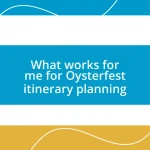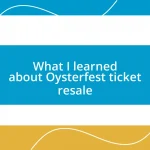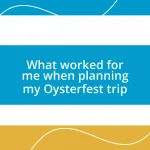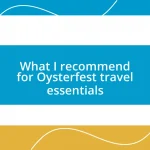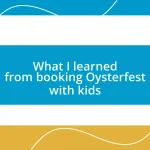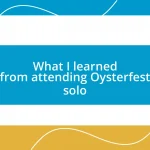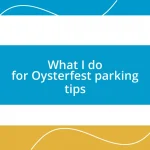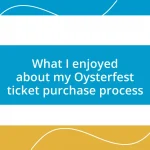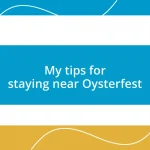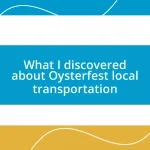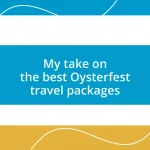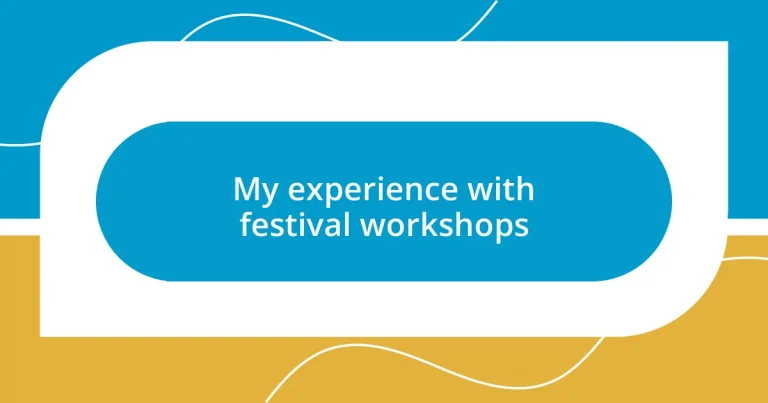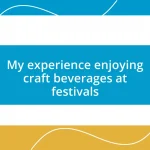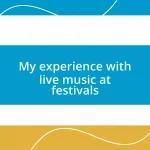Key takeaways:
- Festival workshops offer a welcoming environment that encourages creativity, personal growth, and social connections among participants.
- Choosing the right workshops involves balancing familiar interests with adventurous experiences while considering timing and the festival’s vibe.
- Networking during workshops fosters genuine relationships and collaborative opportunities, enhancing both personal and professional growth.
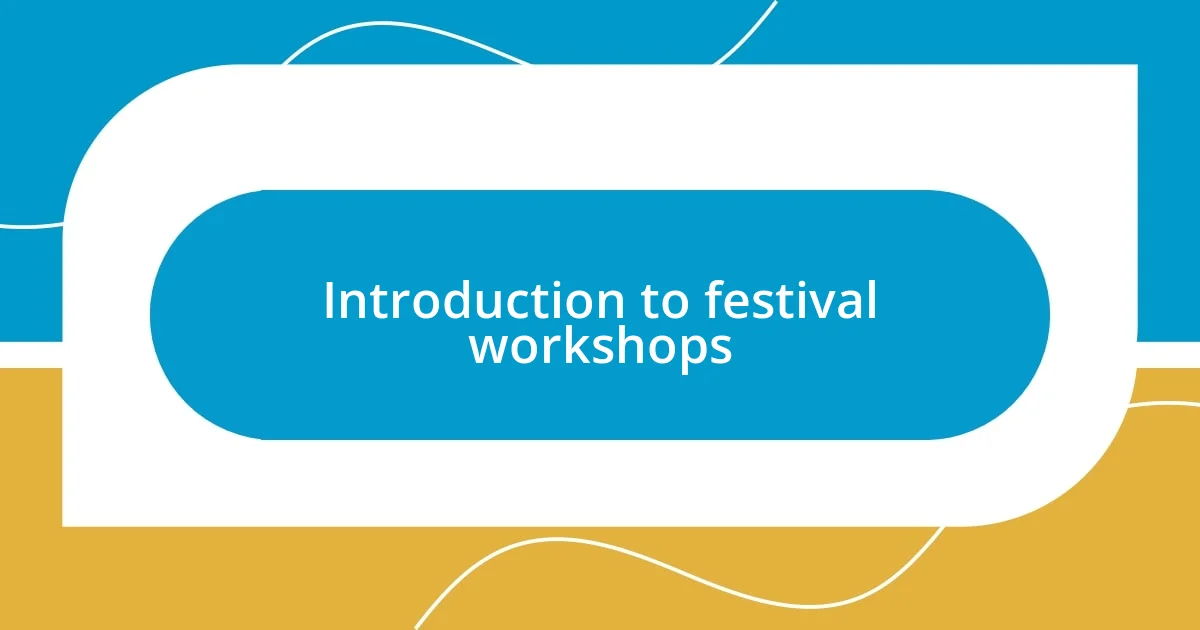
Introduction to festival workshops
Festival workshops are incredible experiences that blend creativity and community, allowing participants to explore new skills and discover passions. I vividly remember my first workshop at a music festival—my enthusiasm was palpable as I stumbled into a drumming session, unsure of what to expect. Has there ever been a moment in your life where you felt the rush of trying something completely new?
These workshops vary widely, from art and dance to cooking and photography, and they often cater to all skill levels. I still cherish the friendships formed during a pottery class one summer, where we shared laughs and experiences while getting our hands dirty. Isn’t it fascinating how creativity can connect people from diverse backgrounds, all gathered to embrace the magic of learning together?
Moreover, festival workshops create a unique atmosphere of encouragement and exploration. I found that the supportive vibe transformed my nervousness into excitement, pushing me out of my comfort zone. Have you ever felt the thrill of learning something you never thought you’d enjoy? That kind of revelation is a gift that festival workshops offer in abundance.
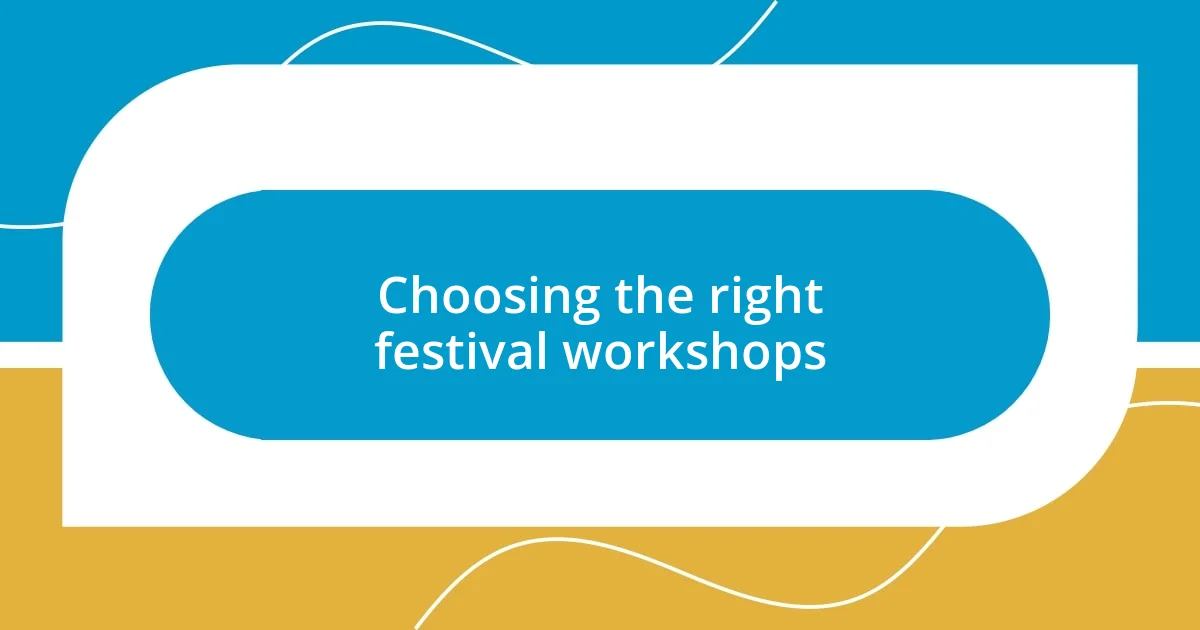
Choosing the right festival workshops
When choosing the right festival workshops, I always consider my interests and how adventurous I’m feeling at the moment. In my experience, it’s essential to balance familiarity with a sprinkle of risk-taking. For instance, one year, I opted for a painting workshop, something I’ve always enjoyed, but I surprised myself by enrolling in a circus skills session the next day. The thrill of balancing on a unicycle was exhilarating!
- Reflect on your potential interests and existing skills.
- Consider stepping outside your comfort zone.
- Look for workshops led by experienced instructors.
- Pay attention to group sizes and participant reviews.
- Think about the overall vibe of the festival—does it align with your style?
Additionally, I find that timing plays a crucial role. I remember trying to squeeze in a cooking workshop while battling fatigue from an all-night concert. It was challenging to focus on chopping techniques when all I could think about was my cozy tent. So, I recommend checking the schedule and giving yourself ample time to prepare for the workshops. After all, the aim is to fully immerse yourself and enjoy the learning experience!
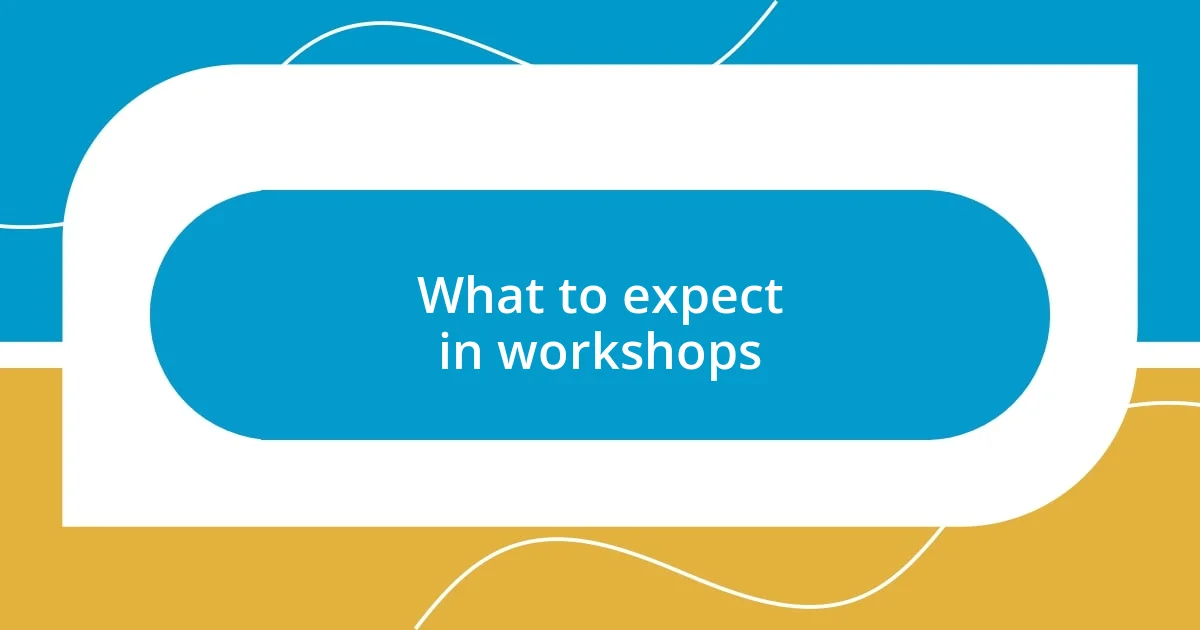
What to expect in workshops
During festival workshops, you can anticipate a warm and welcoming atmosphere where everyone is encouraged to participate. In my experience, it’s this inviting vibe that dissolves barriers and fosters connections among participants. I recall one particular dance workshop where the instructor emphasized that everyone is a dancer at heart. Embracing this mindset helped me shed my insecurities and truly enjoy moving to the rhythm, reminding me of the beauty in letting go of self-doubt.
The diversity in workshop design can vary. You might see hands-on activities where you get to create something tangible, or sessions that are more discussion-based. I remember being part of a storytelling workshop where we shared personal tales, sparking laughter and compassion among strangers. The connections formed in those moments were so impactful—like a thread weaving us together through shared experiences, leaving me with a sense of belonging that I hadn’t anticipated.
You should also expect to gain a wealth of knowledge regardless of the workshop you choose. I left a photography workshop equipped not just with new skills but also a reel of unforgettable memories captured on camera. These workshops are more than just learning opportunities; they’re a chance to cultivate creativity, express yourself, and perhaps even venture into hobbies you never imagined would light a fire in you.
| Aspect | Expectation |
|---|---|
| Atmosphere | Welcoming and supportive |
| Structure | Hands-on activities vs. discussion-based |
| Community Connection | Forming meaningful relationships |
| Learning Outcomes | Both skills and unforgettable experiences |
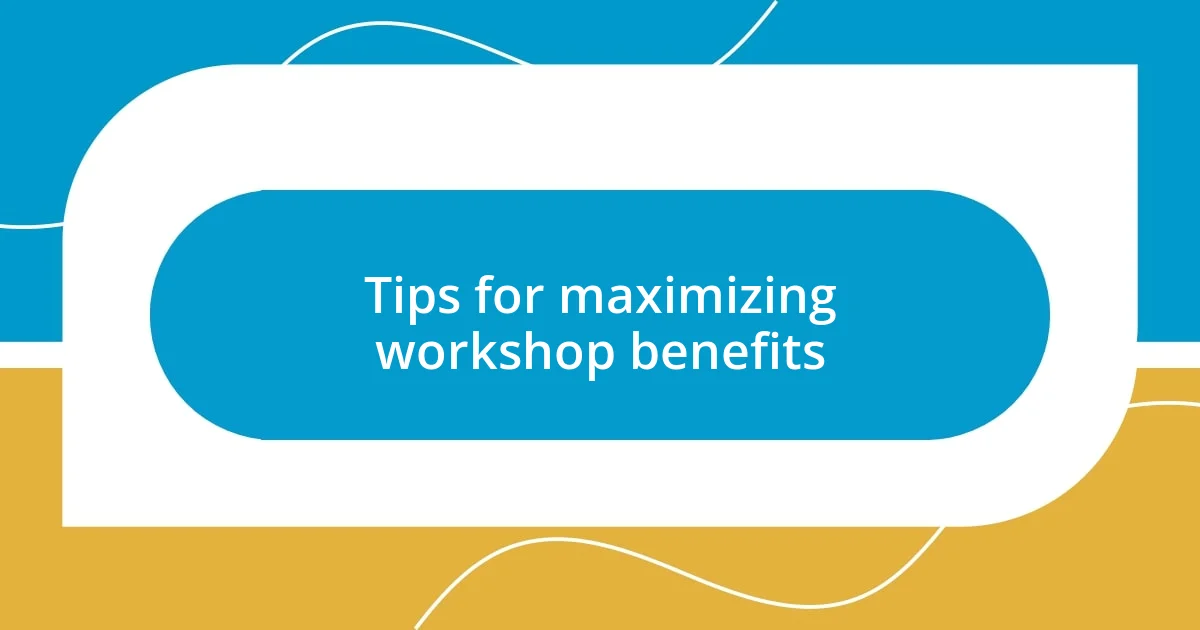
Tips for maximizing workshop benefits
To maximize the benefits of workshop participation, I suggest diving in with an open mind and a readiness to engage. Think about the last workshop you attended—did you fully embrace the activities, or were you hesitant? I recall a ceramics workshop where I nearly held back, worried about my skills. But once I let go of that anxiety and focused on shaping the clay, I was surprised by the joy it brought me. So, don’t be afraid to fully immerse yourself; the experience will become much richer.
Another key aspect is to take notes or jot down reflections during the workshop. I’ve learned that small details can sometimes spark the most significant insights later on. During a creative writing session, I quickly noted an exercise that initially seemed trivial, yet it turned into the cornerstone of a piece I later published. Keeping a journal or digital notes can help you revisit those epiphanies long after the workshop ends.
Lastly, building connections with fellow participants can significantly enhance your workshop experience. I had a conversation with someone at a photography workshop that led to organizing a photo walk together afterward. That simple act not only solidified my knowledge but also sparked a budding friendship centered on our shared passion. So, how often do we take the time to network and engage with others? I’d urge you to make that connection—it’s often where the real learning happens!
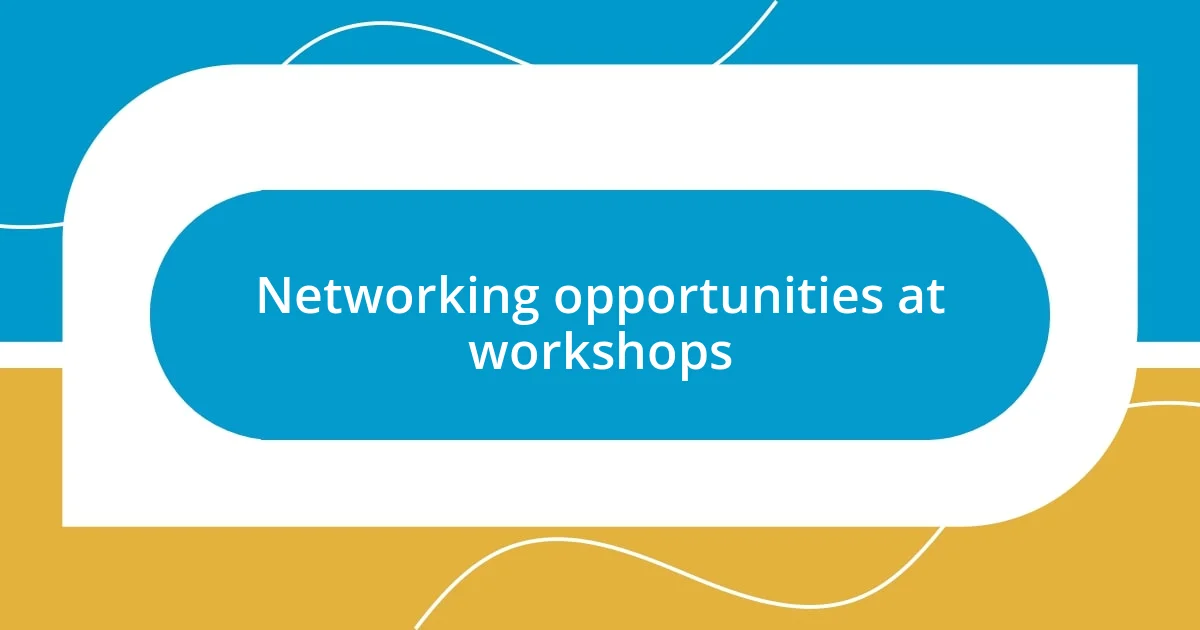
Networking opportunities at workshops
When I attend workshops, the networking opportunities often feel as valuable as the skills I’m acquiring. I remember at a recent graphic design workshop, the group discussions turned into brainstorming sessions where ideas flowed freely. It was a thrill to connect with fellow creatives, leading to collaborations that have blossomed beyond the workshop. I sometimes wonder, how many great projects start from these spontaneous interactions?
I’ve found that genuine conversations often emerge in casual settings, like during breaks or informal networking sessions. In one instance, I chatted with someone over coffee at a music workshop, and what began as small talk about our favorite albums spiraled into discussions about our own artistic endeavors. We exchanged contact details and ended up collaborating on a local gig. So, what if you stepped out of your comfort zone and initiated those conversations? The potential connections might surprise you.
Each workshop I attend reinforces the idea that networking is not merely about exchanging business cards; it’s about forming genuine relationships. At a recent film-making workshop, my passion for storytelling resonated deeply with another attendee. We ended up sharing our struggles and triumphs in our respective journeys. That honest exchange fostered a connection that has now become a supportive friendship, where we quite literally cheer each other on from the sidelines. Isn’t it fascinating how meaningful relationships can enrich both our personal and professional lives?
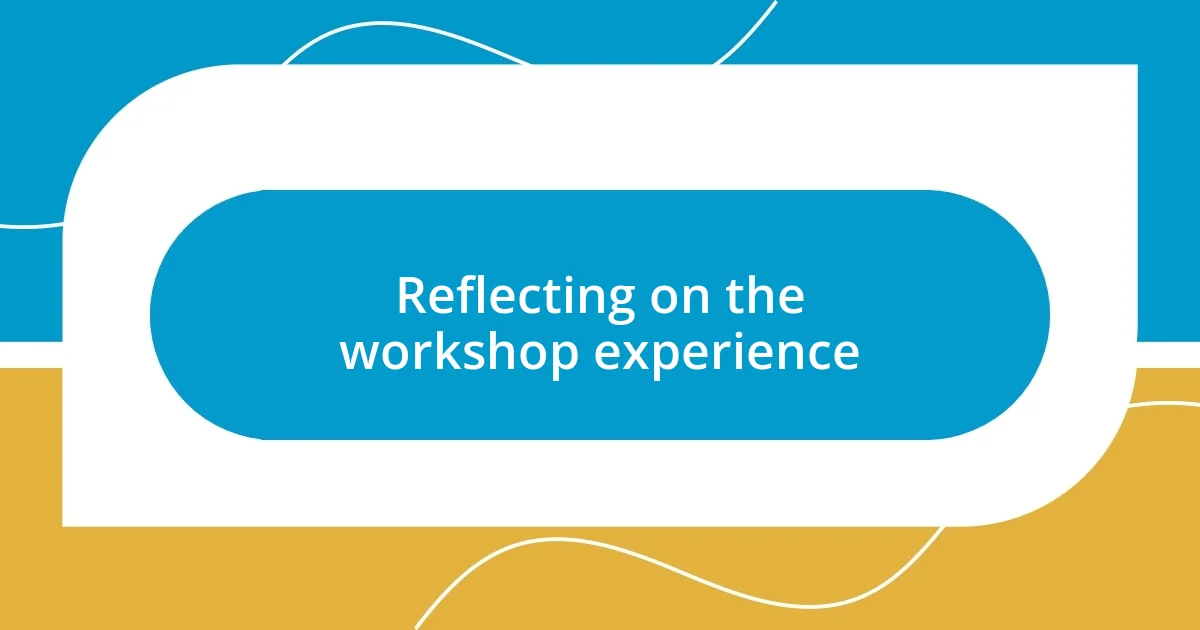
Reflecting on the workshop experience
Reflecting on each workshop experience is an eye-opening journey. I remember leaving a dance workshop feeling like I had uncovered a new part of myself. As I explored unfamiliar movements, I initially felt clumsy, but that awkwardness transformed into liberation. Have you ever experienced that sense of freedom when stepping into something new? It’s a reminder of how workshops can allow us to break down self-imposed barriers.
The emotional highs and lows during these sessions often linger long after the event. At a cooking workshop, I attempted a dish that had stumped me for years. When I finally nailed the recipe, the pride I felt was overwhelming. In that moment, the workshop became more than just cooking; it embodied resilience and growth. These small victories can be such powerful motivators. Can you recall a moment when you felt an unexpected surge of confidence during a workshop? It’s truly magical.
Each workshop also serves as a catalyst for self-reflection. After a recent pottery session, I sat quietly with my creation, contemplating what it symbolizes—my journey, my flaws, and my growth. I often ask myself, “What does this piece say about me?” This practice of introspection deepens my understanding of not just the craft, but of myself. Have you ever taken a moment to truly reflect on what you’ve learned and how it applies to your life? It’s these insights that create meaningful connections to both the art and to one’s personal journey.
